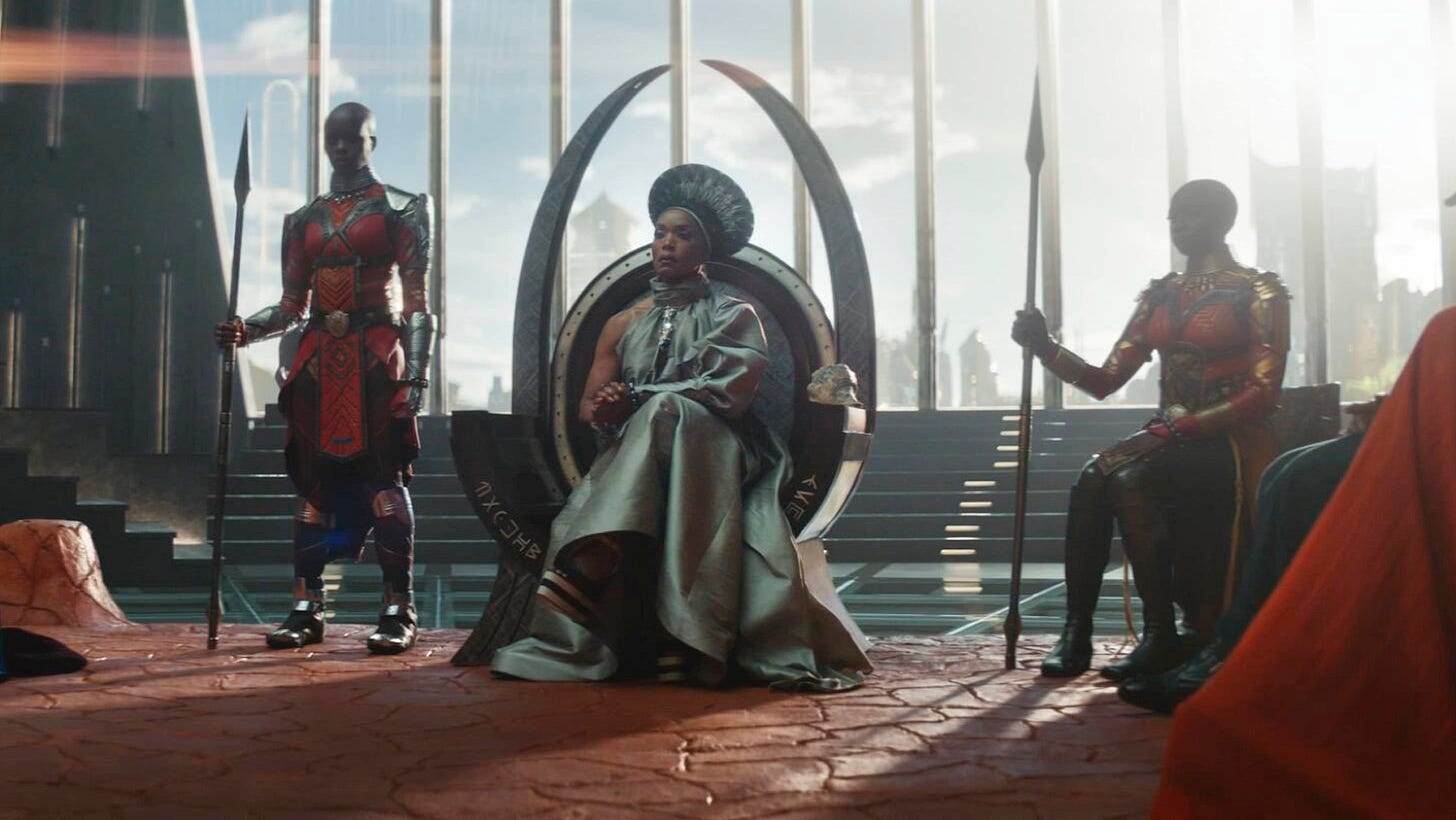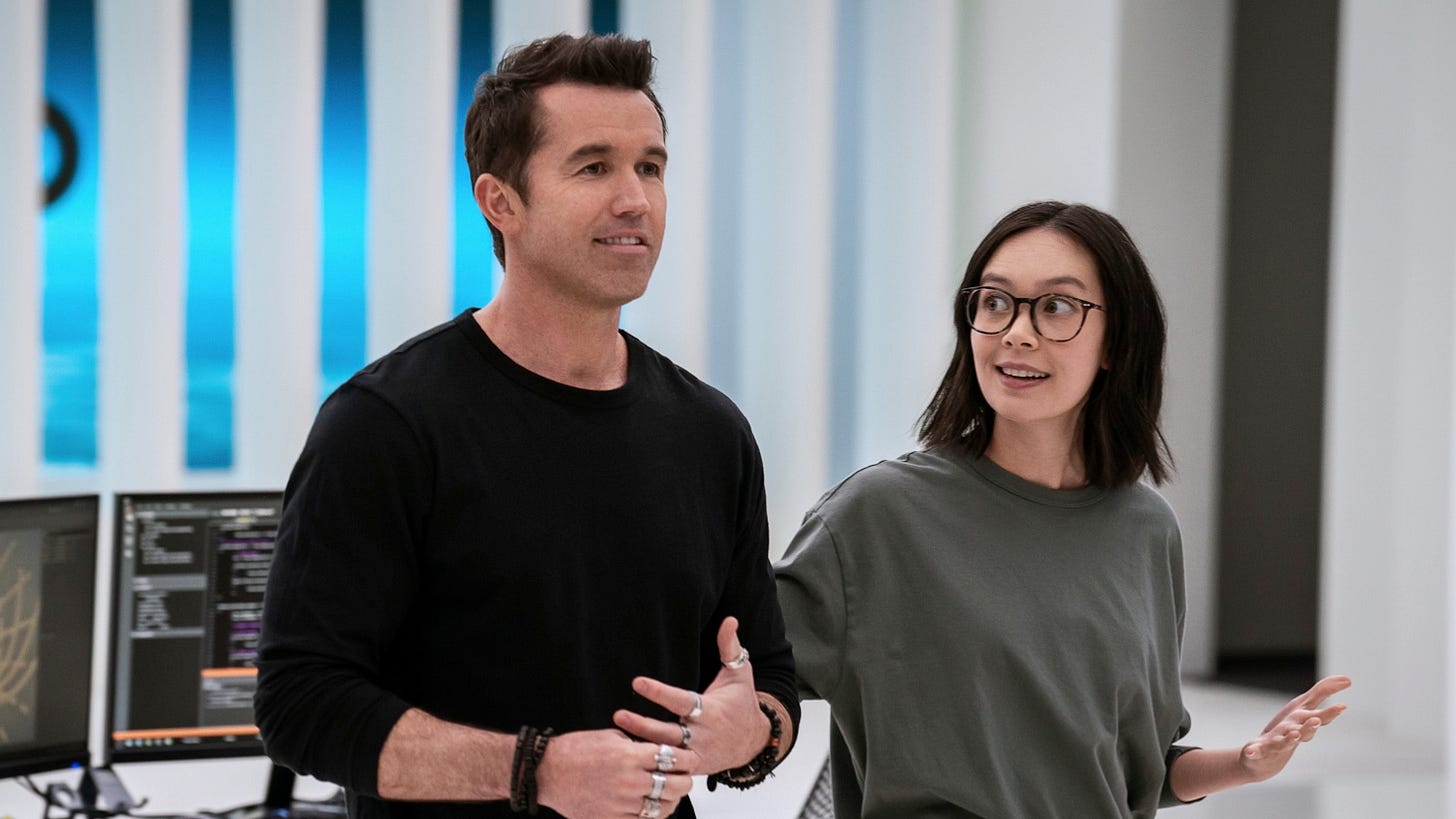Weekend Watch: Black Panther: Wakanda Forever, Mythic Quest Season 3
A nation mourns a king while facing a new challenge and the video game team finds fresh problems
Image Credit: Marvel Studios
Welcome to the latest edition of Weekend Watch, in which I recommend (or occasionally warn against) movies or TV shows I’ve been checking out. This week, Wakanda grieves, and the Mythic Quest team develops. Follow James on Twitter: @jamwhite
2018’s Black Panther was widely – and deservedly – acclaimed for its thrilling storyline, vital, fulsome portrayal of a society, a talented cast making the most of well-written roles and a layered plot with a compelling villain whose worldview was something it was easy to empathise with.
It suffered slightly from what people often point to with Marvel movies – a muddy, busy finale over-reliant on CG effects that didn’t honour what had come before. It still made more than a billion worldwide, sparked a moment in the pop cultural zeitgeist and won some warranted Oscars.
It’s with regret that I report the sequel, Black Panther: Wakanda Forever has many of the issues of the first, but fewer of the positives.
Make no mistake – this is still professionally crafted by director Ryan Coogler and his team, who bring Wakanda (when we’re properly there, and not jetting or diving elsewhere) to life with all the style, beautiful costuming and well-considered characters you remember.
The biggest issue, of course, is that the beating heart of the Panther films – when he wasn’t necessarily being a stoic ruler, T’Challa was a good friend and fantastic family member – actor Chadwick Boseman, is gone. Coogler chooses to have T’Challa dead also, mourned and celebrated early on by his nation in an exuberant fashion.
That resulting central vacuum is for a time ably filled by the rest of the cast. It didn’t hurt that the first film set up the likes of Angela Bassett, Letitia Wright, Lupita Nyong’o and Winston Duke’s characters as compelling people even when they weren’t sharing screen time with Boseman.
Duke remains raucous and likeable, broad but human and a healthy source of humour punctuating the movie’s more serious tone. Like a Black Brian Blessed, his M’Baku – ruler of the Jabari tribe who once again offers their aid to the others in Wakanda when tragedy strikes – brightens every scene he’s in. And he’s fortunately in more of them this time.
Bassett is, of course, imperious as Queen Ramonda, who has had to step into ruling in T’Challa’s absence. But when she’s not treating UN council members like rowdy schoolkids, she’s also tender and wise.
Wright brings new sides to tech genius Shuri, who was a cheeky highlight in the original film. Here, she’s blinded by sorrow and rage at not being able to save her big brother and pushing angrily against the traditions of her society.
Nyong’o’s Nakia had her own connection to T’Challa, and while she at first appears to be the one most able to handle her grief, the script and actor peel away the layers to show that’s not necessarily true. A late story turn, though, is more gratuitously cloying than the filmmakers likely intended.
Obviously, Boseman’s death impacted the writing and the filming of the sequel, and the grief over his untimely loss runs through the veins of Wakanda Forever. But it also means that the film and its makers are consumed with the concept. In some instances – Wright’s Shuri angrily retreating into technology to deal with her pain –it works well. In others, it feels as though feeding that side has left other sections of the story undernourished.
Even with a weighty two hours and 40 minutes, the undersea kingdom of Talokan, ruled by new MCU recruit (but decades-old comic book character) Namor never quite feels as alive as it should. The comparisons with Wakanda are apparent, but the movie rarely gives the watery world the impact it needed.
As Namor, Tenoch Huerta Mejía swings between feeling like a genuine threat, a tragic man and a noble warrior. But Mejía isn’t always given what he needs to make the role shine, and he isn’t always as convincing as he might be. His associates, meanwhile, usually feel like rote warriors. And the less said about his backstory, the better, a chunk of the script that needed a serious rewrite to avoid cliché.
A brighter new spot is young genius Riri Williams, who factors into the plot through some unwieldy, underwritten machinations, but once properly introduced, proves to be a delight, instantly finding common ground with Shuri and, like M’Baku, a source of fun under all the weighty emotions blanketing the story.
Sadly, her Ironheart suit is nothing short of embarrassing on an effects level, coming across as something out of Power Rangers than a top-notch Marvel design. It stands out even more given how excellent Hannah Beachler’s production design is elsewhere. Perhaps that’s something that will be addressed when Riri shows up next year on her own Disney+ series, Ironheart. But I profoundly hope they don’t just port across the CG elements of the suit.
And while there isn’t an overabundance of cramming in Marvel connective tissue, what there is outside of Riri feels gratuitous and rarely does more than shove the plot along in the most obvious ways. One character (not Martin Freeman, who does solid work as returning CIA agent Everett Ross) is more annoying than useful.
It’s disheartening to be so disappointed with a sequel to a movie from the team who made such an excellent original. Some parts of Wakanda Forever shine, but they’re mostly ported over from the first film, brushing up uncomfortably against the less impressive additions of the new one.
Black Panther: Wakanda Forever is in UK and US cinemas now.
Image Credit: Apple TV+
Mythic Quest, the Apple TV+ comedy series set at a video game company, experiences its own growing pains as it hits season 3, but is by a healthy margin, closer to the fun of the first two seasons.
Set roughly a year after the second season finale, we pick up as Ian Grimm (series co-creator Rob McElhenney) and Poppy (Charlotte Nicdao) are deep into designing their new game, Hera, at their odd, all-white office that looks like something out of 2001. Former tester Dana (Imani Hakim) is their assistant.
Back at Mythic Quest, David (David Hornsby) is leading the new regime, with Jessie Ennis’s Jo still manipulating things behind the scenes and the suspicious return of former financial officer Brad (Danny Pudi) fresh out of prison for insider trading and working as a janitor.
Though the team has partly gone their separate ways, the entertainment value remains high, and though there is some occasional feeling of treading similar paths in terms of characters and behaviour, there is still a lot of fun to be had watching Ian be insufferable, Poppy neurotic, David nervous and Jo calculating.
The writers find interesting new pairings to keep the story fresh and there’s even a touching/silly farewell to sci-fi writer C.W. Longbottom (F. Murray Abraham, who left the show after season 2 for unknown reasons).
Mythic Quest’s scripts remain fizzy and still gloriously blend the smart and the stupid. Though its usual flashback episode exploring some of the main characters’ youth can’t quite match some previous examples (or the high point of Quarantine/Everlight from Season 1), it’s still a welcome format-breaker.
Already renewed for Season 4, Mythic Quest remains a sterling example of workplace comedy.
The first two episodes of Mythic Quest Season 3 are on Apple TV+ now, with a new episode arriving weekly. I’ve seen the whole season.




